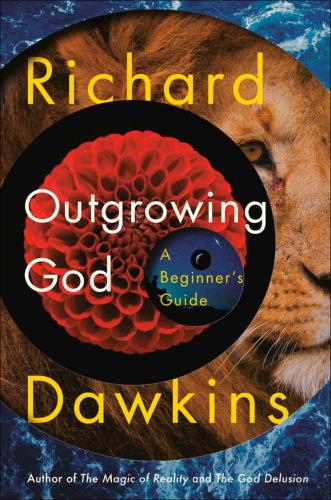
Outgrowing God
A Beginner's Guide
کتاب های مرتبط
- اطلاعات
- نقد و بررسی
- دیدگاه کاربران
نقد و بررسی

July 1, 2019
Atheist proselyte and biologist Dawkins (Science in the Soul: Selected Writings of a Passionate Rationalist, 2017, etc.) sounds well-tested themes against the existence of supreme beings. In the author's view, religion is a species of "pigeon-like superstition," something that parents tell children because their parents told them things were how they were because--well, because some god or gods made them so. In times past, we might have believed in pixies, sprites, or Olympian gods; now monotheistic strains of religion are the order of the day. Once a person learns about natural selection, writes Dawkins, things change. When it becomes clear that human DNA is, among other things, "a set of instructions for how to build a baby," then some of the old mystery wears off and the thinking adult finds no need for belief in invisible deities. Dawkins scores some good points, observing, for instance, monotheism as practiced by Christianity and Islam is "rather suspect," since its belief in an almost equal but opposite devil is ipso facto polytheistic, and the whole trinity thing of Christianity "sounds like a formula for squeezing polytheism into monotheism." The author's dismissal of religion, to say nothing of religious impulses, may well strike some readers as cavalier. And in some ways, his reasoning has not evolved substantially since he, as a former Church of England lad, decided that if he had been born to Vikings, he would be worshipping Odin, and if to Jewish parents, he would still be awaiting the messiah. In the end, Dawkins characterizes religion as fake news, the kind of thing that the internet proves daily--namely, that "people simply make stuff up." A little Dawkins-ian snark--believers believe because "they aren't well educated in science"--goes a long way, but there's plenty of food for thought here. Dawkins sings to the choir, though like-minded unbelievers will find ample support for their beliefs--or lack thereof.
COPYRIGHT(2019) Kirkus Reviews, ALL RIGHTS RESERVED.

September 1, 2019
Dawkins (The Selfish Gene; The God Delusion) is forthright in his views on the implications of the evolutionary biological perspective for our understanding of humanity and its place in the universe, this latest work adding to his arguments against belief in a supreme deity. The majestic complexity of life, from the seemingly designed structure of DNA to the elaborate physiology of organic life and intricate patterning in inorganic matter, can all be accounted for by the theory of evolution, broadly conceived, contends the author. His discussions are conveyed in a relaxed, conversational tone that makes the book a pleasure to read. Is the analysis convincing? If Dawkins narrowed the target of his statements to organized religions he would stand a better chance of success. As is, Darwinian evolutionary critiques fail to undermine the reasonableness of belief in God. These theories can account for the complexity encountered in life, but not why there is a universe of experience as such. For that you need an explanation that goes beyond science. Whether the answer is God is another matter. VERDICT The work is guaranteed to start conversations between theists and atheists and is recommended for it.--Denis Frias, Mississauga Lib. Syst., Ont.
Copyright 2019 Library Journal, LLC Used with permission.

September 9, 2019
Dawkins (The God Delusion) purports to guide his readers through letting go of belief in God in this underwhelming repackaging of ideas from his previous works. For the first half of the book, Dawkins argues that the Bible is a faulty foundation for belief that lacks any basis in historical reality and advances a cruel, inconsistent set of values. He then proceeds with a thorough explanation of evolution and critique of intelligent design. As this progression makes clear, the book primarily concerns itself with Bible-based Protestantism. Dawkins avoids seriously considering non-Western religions, Judaism, Islam, and Roman Catholicism; they appear when they bolster his claims, and are curiously absent when they might undermine them (for instance, he frames religious opposition to abortion as a conflict between “absolutists and consequentialists” without mentioning religions that don’t fit his paradigm, such as Judaism). Dawkins’s glib analysis is paralleled by his slipshod engagement with the ideas and methods of the humanities. Historical evidence from the times of the Bible’s creation, for instance, is deemed wholly unreliable—unless it undermines biblical narratives. By starting with the assumption that religious belief is too ridiculous for serious and sustained engagement, Dawkins is preaching to the converted. Readers interested in the rationale for atheism will be disappointed in this underdeveloped argument that never takes spiritual belief seriously.

August 1, 2019
Aiming to create a first book on atheism, with young people particularly in mind, atheist standard-bearer Dawkins makes a two-part presentation. The first part, Goodbye God, reviews all the physical and historical falsehoods and outdated attitudes in the Bible and also the shortcomings of the biblical God as a guide to ethics, especially in the Ten Commandments. Because Dawkins is not a philosopher, those familiar with philosophical proofs of God will find this discussion inadequate; still, he presents the pragmatic case against God cogently, if a mite snootily (supplement Dawkins with fellow but less-dismissive atheist Tim Crane's The Meaning of Belief, 2017). The second part, Evolution and beyond, is better, because Dawkins is an evolutionary biologist and ethologist, thoroughly capable of explaining Darwinian evolution and illuminating how creatures on the large scale and crystals, for instance, on the tiny scale are actually made by random but precise operations, rather than by any kind of designer, such as God. Dawkins fulfills his intentions very well for readers new to the subject, from high school to retirement.(Reprinted with permission of Booklist, copyright 2019, American Library Association.)

























دیدگاه کاربران